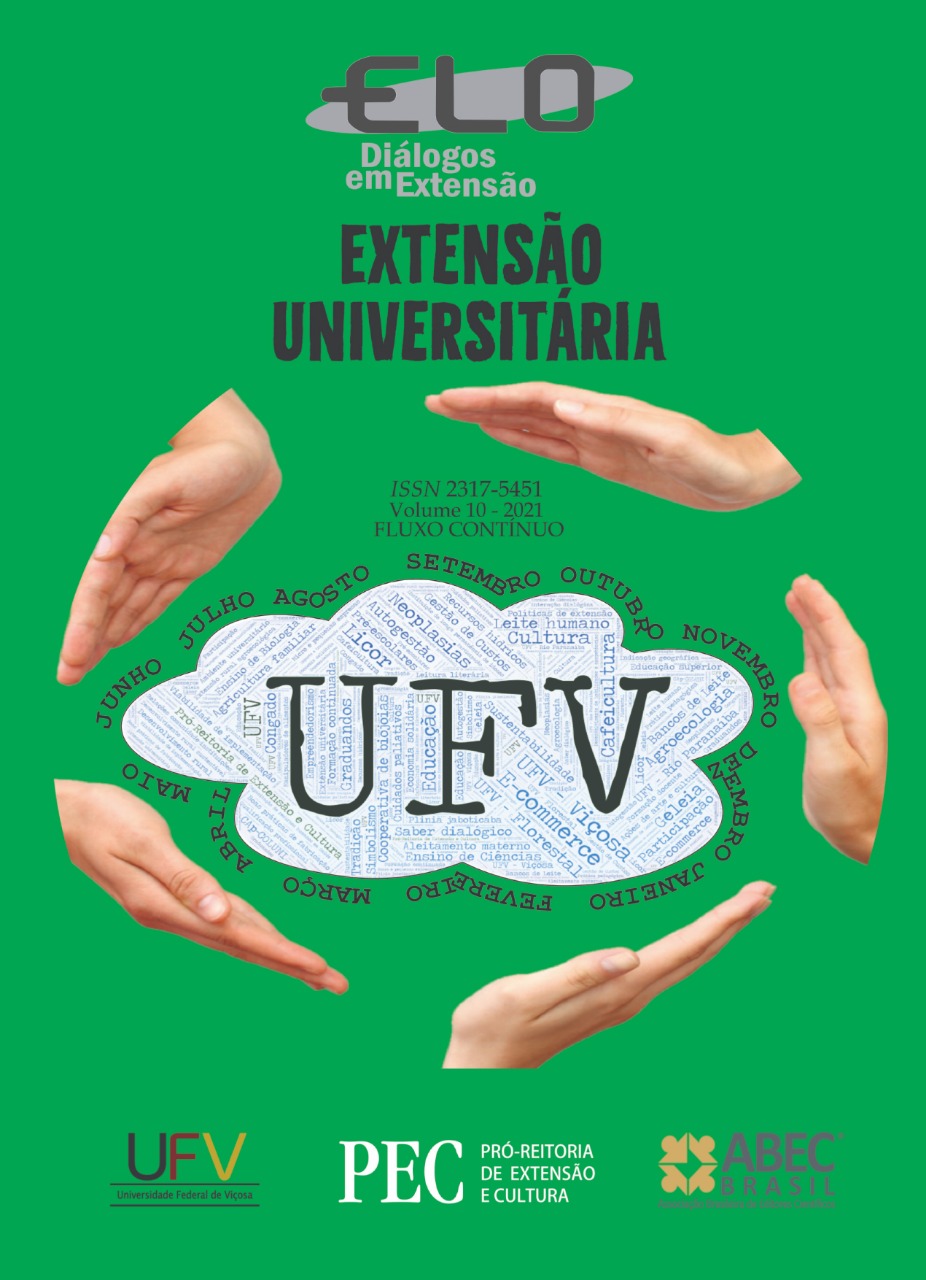Formação de multiplicadores para reciclagem de resíduos orgânicos por meio da compostagem em tempos de pandemia
DOI:
https://doi.org/10.21284/elo.v9i.11875Keywords:
In 2016, Brazil generated about 78.3 million tons of solid urban waste (MSW), with half of all this waste being organic. The degradation of the organic fraction of grounded MSW occurs with the production of greenhouse gases and leachate that pose risks to the soil, air, water and public health. The simplest treatment for this type of waste is composting. Therefore, this extension project aimed to form multipliers from the external community to recycle organic waste through composting. The training offered to the external community 100% online generated fifteen videos on the subject, in the form of Lives, which are available on the IFSC's YouTube channel - Campus Garopaba, where in addition to the lectures, there was an exchange of knowledge with the external community. Initially, 1291 applications were received from different regions of Brazil and at the end 417 certificates of participation were issued to those who managed to fulfill 75% of attendance in the course.Abstract
In 2016, Brazil generated about 78.3 million tons of solid urban waste (MSW), with half of all this waste being organic. The degradation of the organic fraction of grounded MSW occurs with the production of greenhouse gases and leachate that pose risks to the soil, air, water and public health. The simplest treatment for this type of waste is composting. Therefore, this extension project aimed to form multipliers from the external community to recycle organic waste through composting. The training offered to the external community 100% online generated fifteen videos on the subject, in the form of Lives, which are available on the IFSC's YouTube channel - Campus Garopaba, where in addition to the lectures, there was an exchange of knowledge with the external community. Initially, 1291 applications were received from different regions of Brazil and at the end 417 certificates of participation were issued to those who managed to fulfill 75% of attendance in the course.
Downloads
References
ABNT. NBR 13591: Compostagem. Rio de Janeiro: Associação Brasileira de Normas Técnicas (ABNT). 1996.
ABRELPE. Panorama dos Resíduos Sólidos no Brasil 2013. São Paulo: [s.n.], 2013. Disponível em: <https://abrelpe.org.br/panorama/> Acesso em: 08 Fev. 2021.
ABRELPE. Panorama dos Resíduos Sólidos no Brasil 2015. São Paulo: [s.n.], 2015. Disponível em: <https://abrelpe.org.br/panorama/>. Acesso em: 08 Fev. 2021.
ABRELPE. Panorama dos Resíduos Sólidos no Brasil 2017. São Paulo: [s.n.], 2017. Disponível em: <https://abrelpe.org.br/panorama/>. Acesso em: 08 Fev. 2021.
ABUSHAMMALA, Mohammed F.M. et al. Methane and carbon dioxide emissions from Sungai Sedu open dumping during wet season in Malaysia. Ecological Engineering, v. 49, p. 254–263, dez. 2012. Disponível em: <http://www.sciencedirect.com/science/article/pii/S092585741200273X>. Acesso em: 08 Fev. 2021.
ANDRADINA. Compostagem: Composteira Doméstica. 2018. Disponível em <https://www.andradina.sp.gov.br/portal/noticias/0/3/7821/compostagem-composteira-domestica/>. Acesso em: 15 Fev. 2021.
BRASIL. PLANO NACIONAL DE RESÍDUOS SÓLIDOS. Brasília: [s.n.], 2011. Disponível em: <http://www.mma.gov.br/estruturas/253/_publicacao/253_publicacao02022012041757.pdf>. Acesso em: 25 Mar. 2019.
BRASIL. Ministério do Meio Ambiente. Compostagem doméstica, comunitária e institucional de resíduos orgânicos: manual de orientação / Ministério do Meio Ambiente, Centro de Estudos e Promoção da Agricultura de Grupo, Serviço Social do Comércio. -- Brasília, DF: MMA, 2017. 168 p., il.; gráficos. ISBN: 978-85-7738-313-9.
COELHO, Vinicius Teixeira. DESENVOLVIMENTO DE UM PROTÓTIPO DE UMA COMPOSTEIRA ELETRÔNICA PARA USO RESIDENCIAL. Florianópolis: [s.n.], 2013. Disponível em: <http://www.professorpetry.com.br/Ensino/Defesas_Pos_Graduacao/Defesa%2041_Vinicius%20Teixeira%20Coelho_Desenvolvimento%20de%20um%20Proto%CC%81tipo%20de%20uma%20Composteira%20Eletro%CC%82nica%20para%20Uso%20Residencial.pdf>. Acesso em: 08 Fev. 2021.
HOORNWEG, Daniel; BHADA-TATA, Perinaz. What a Waste?: A Global Review of Solid Waste Management. 1 mar. 2012. Disponível em: <https://openknowledge.worldbank.org/handle/10986/17388>. Acesso em: 08 Fev. 2021.
IPCC. Fifth Assessment Report - Climate Change 2013. Disponível em: <https://www.ipcc.ch/report/ar5/wg1/>. Acesso em: 08 Fev. 2021.
MALINOWSKY, Carina. Tratamento dos resíduos sólidos orgânicos da UFSC através de biodigestor anaeróbio. 2016. Disponível em: <https://repositorio.ufsc.br/handle/123456789/167638>. Acesso em: 08 Fev. 2021.
NUCASE. NÚCLEO SUDESTE DE CAPACITAÇÃO E EXTENSÃO TECNOLÓGICA EM SANEAMENTO AMBIENTAL. Resíduos Sólidos: Projeto, Operação e Monitoramento de Aterros Sanitários.: Guia do profissional em treinamento: Nível 2. ReCESA, p. 112, 2008.
ONU. Objetivos do Desenvolvimento Sustentável. Disponível em: <https://brasil.un.org/pt-br/sdgs>. Acesso em: 08 Fev. 2021.
PROSAB. MANUAL PRÁTICO PARA A COMPOSTAGEM DE BIOSSÓLIDOS. Londrina: [s.n.], [s.d.]. Disponível em: <https://www.finep.gov.br/images/apoio-e-financiamento/historico-de-programas/prosab/Livro_Compostagem.pdf>. Acesso em: 08 Fev. 2021.
SANTOS, Ricardo Henrique Silva, et al. Compostagem: preparo, utilização e comercialização. SENAR, Brasília, 2011, 68 p. 3.ed.
SENAR. Programa Olericultura Orgânica. São Paulo: [s.n.], 2009. Disponível em: <http://www.agrarias.ufpr.br/portal/marzagao/wp-content/uploads/sites/25/2015/12/ApostilaSENAR-M2-Olericultura-Compostagem.pdf>. Acesso em: 08 Fev. 2021.
SNIS. Diagnóstico do manejo de Resíduos Sólidos Urbanos – 2011. 2011. Disponível em: <http://www.snis.gov.br/diagnosticos/residuos-solidos>. Acesso em: 08 Fev. 2021.
SNIS. Diagnóstico do manejo de Resíduos Sólidos Urbanos – 2012. 2012. Disponível em: <http://www.snis.gov.br/diagnosticos/residuos-solidos>. Acesso em: 08 Fev. 2021.
SNIS. Diagnóstico do manejo de Resíduos Sólidos Urbanos – 2013. 2013. Disponível em: <http://www.snis.gov.br/diagnosticos/residuos-solidos>. Acesso em: 08 Fev. 2021.
SNIS. Diagnóstico do manejo de Resíduos Sólidos Urbanos – 2014. 2014. Disponível em: <http://www.snis.gov.br/diagnosticos/residuos-solidos>. Acesso em: 08 Fev. 2021.
SNIS. Diagnóstico do manejo de Resíduos Sólidos Urbanos – 2015. 2015. Disponível em: <http://www.snis.gov.br/diagnosticos/residuos-solidos>. Acesso em: 08 Fev. 2021.
SNIS. Diagnóstico do manejo de Resíduos Sólidos Urbanos – 2016. 2016. Disponível em: <http://www.snis.gov.br/diagnosticos/residuos-solidos>. Acesso em: 08 Fev. 2021.
Downloads
Published
How to Cite
Issue
Section
License
Copyright (c) 2021 Revista ELO – Diálogos em Extensão

This work is licensed under a Creative Commons Attribution 4.0 International License.
Authors who publish in this journal agree to the following terms:
A. Authors grant the journal the right of first publication, with the work simultaneously licensed under the Creative Commons Attribution License which allows the sharing of work with acknowledgment of authorship and initial publication in this journal.
B. Authors are authorized to take additional contracts separately, for non-exclusive distribution of the version of the work published in this journal (e.g. publish in institutional repository or as a book chapter), with acknowledgment of authorship and initial publication in this journal.
C. The journal holds the right to make format, orthographic and grammatical changes in the article to ensure the language standards, respecting the author’s style as well.
D. The opinions expressed by the authors are of their exclusive responsibility.















